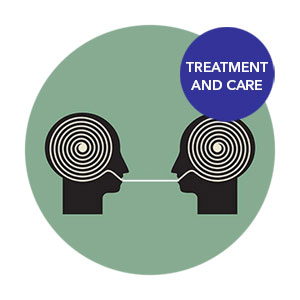TREATMENT AND CARE
Listen to the audio version of this article:
One of the first steps to establishing a good course of psychotherapy is to build a treatment contract. A treatment contract is an explicit agenda and function of what you will be doing together. For many people, this never seems to happen. You and your therapist sit down and talk about things, sometimes with a greater emphasis on support and empathy, sometimes with some instructional skill-building. Any of those things are good, but are they in the contract?
Treatment Contract
A treatment contract involves many things important to the therapeutic relationship. It also emphasizes the nature of your relationship as fiduciary. A fiduciary clinical relationship is one built on trust. You trust your therapist, not the other way around (a therapist may or may not trust you, and that ingredient would only be explored involving certain therapy transference principles). In exchange for that trust, you typically pay a fee. The therapy relationship begins from that position – trust and an agreed upon rate of exchange.
This exchange component is incredibly important if your therapy is going to be helpful. In fact, you are paying a fee or using your insurance to emphasize the one-sided nature of the relationship. Otherwise, you would simply be friends getting together to talk about life and we know psychotherapy to be something different than that, and more healing as a result.
What are some of the most common ingredients you would place in a psychotherapy treatment contract? Examples could include:
- Agreed upon fees
- Office policies such as cancellation deadlines
- Basic schedule for when you will meet for an appointment
- Length of appointments
- Total length of the course of therapy
- Therapeutic agenda
- Therapy style (i.e. reflective therapy vs homework vs skill-building)
- Concepts of safety and confidentiality, including legal reasons where it may need to be broken
- Limits and boundaries to the relationship
An Agreement
It’s important to note that treatment contracting is not necessarily a signed piece of paper. That could be a layer to this, especially regarding fee schedule and office policies, but we’re looking at it from a more abstract lens. The contract is the agreement you each make with each other. Through fulfilling that agreement, trust continues to build and the therapeutic bond begins to take shape. Some of the simplest agreements involved in therapy include things that you could easily forget about. For instance, your therapist agrees to be at the office at your appointment time and be reliable.
Trust
Many of the above components of treatment contracting involve the building and analysis of trust. If you’ve sought out a therapist before, you may not have realized it, but you were looking into certain factors to determine if you could trust the person. Could you trust their experience? Could you trust their precision and attention to detail? The ability for them to keep your problems confidential and secure? You may even be trying to determine if the person is physically safe for you, as that is especially valid for victims of prior trauma or abuse in their lives.
By arranging a good treatment contract, you set the stage for creating real change in your life. You also prevent unnecessary conflicts with a good contract that meets both parties’ needs. This can actually be a significant problem for therapists who are too giving with their patients and often grow to resent them based on being too flexible or generous around issues of time and money.
Past Therapy Experience
If you have worked with a therapist in the past for an issue in your life, looking back, was there good treatment contracting? Were there ever times that the contract was broken for different reasons? Either the therapist or you didn’t stick to the contract and things felt awkward. This can happen in very subtle ways. For instance, a therapist who emphasizes too much of his or her self-experience in life may be bending the contract. This is incredibly common and somewhat speaks to the emotional difficulty of being a therapist. There is often an urge to talk about one’s own experience. In moving towards too much advice-giving, the relationship gradually changes. It still can be helpful, but you need to understand the change and how that will affect things.
Have you stopped seeing a prior therapist because you felt it didn’t meet your needs or for somewhat vague reasons? You didn’t have enough time, it was too expensive, it was boring? All of these things could actually be connected to more complex therapeutic topics. It also is important to acknowledge that if a therapy relationship breaks down, it isn’t necessarily either person’s fault. Rather it could be a marker of an unconscious process that played out in the office. If these issues can be worked through in some way, especially attending to past therapy experiences and the patient-therapist relationship, you can reach a strong breakthrough that would be valuable for you in all relationships.
Final Thoughts
An experienced therapist is able to help you talk about some of these things and also is aware of his or her own limitations. The therapist may be very direct about how he or she sets up policies, runs the practice, and commits to helping people. Often this degree of self-awareness by the therapist builds further trust that the person can offer you something through your time together.
It also conveys that the therapist isn’t really planning to bend things, and this connects to themes of boundaries which are incredibly important in the patient-therapist relationship. Setting things up well, in terms of treatment contracting, will align you and the therapist to maximize your time together and reach greater progress.




